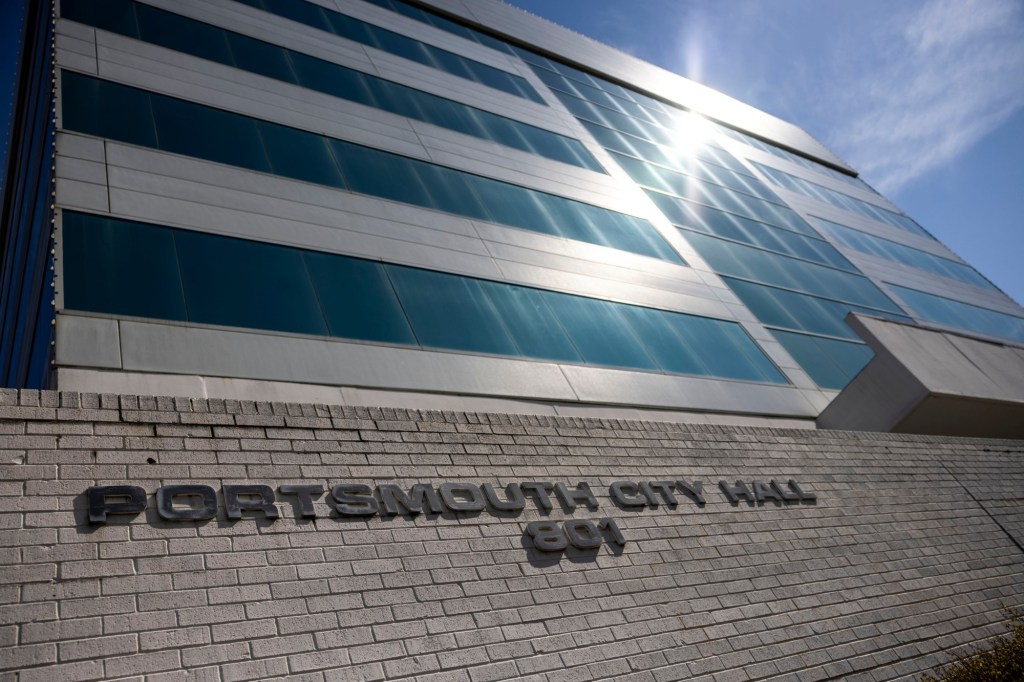PORTSMOUTH — Portsmouth’s proposed $1.02 billion fiscal 2026 budget includes tax relief on vehicles and real estate, employee raises and funding for a new public safety facility and long-term planning for relocation of City Hall.
The proposed operating budget, which will span July 1 to June 30, 2026, is $873.5 million, while the multi-year capital improvement plan will use $143 million in fiscal 2026.
Residents can weigh in on the proposed budget during city council meetings on April 8 and April 22. Council is expected to adopt the budget in May.
Following Portsmouth City Council action Tuesday, taxpayers may see lower vehicle tax bills as overall assessments decreased and council members again granted a 50% tax credit on personal property. Council members are also weighing another real estate tax credit that would effectively lower the rate for taxpayers.
Growth in city revenue will help cover the cost of some projects and policies. Overall, general fund revenue is up 3.5%, amounting to $338 million in the fiscal 2026 budget. The city saw 3.6% growth in real estate assessments in calendar year 2024, and anticipates an additional $6 million property tax revenue — $136 million total — in the proposed budget.
Some fees will increase, however, including water and sewer rates, which will both increase by 5% to cover necessary maintenance, repairs and upgrades, particularly to sewer pump stations. That amounts to $5.71 per 100 cubic feet for water and $4.49 for sewer. For the fiscal 2018 budget, the council enacted a 5% annual increase to the city’s water and sewer rates to comply with federal and state mandates for managing aging infrastructure.
The city’s personal property tax rate for vehicles will remain at $5 per $100 of assessed value, but council approved an ordinance Tuesday that grants 50% in tax relief off the assessed value of vehicles for the first $20,000 of value proposed. Each city receives a fixed amount of state funding each year to provide the tax relief.
Personal property tax revenue is projected at $38 million for the proposed budget following a 3-5% decrease in 2024 assessments. The median value of a vehicle in Portsmouth is $24,324 and the average value is $31,854.
Portsmouth charges the highest real estate tax rate in the region. But for at least the third fiscal year in a row, the city’s budget includes a tax credit. The fiscal 2026 budget proposes a 6-cent credit, bringing the effective rate from $1.30 per $100 of valuation to $1.24. Council enacted a 5-cent credit to the tax rate in previous years.
City leaders say the proposed budget will use $18 million in anticipated casino revenue to boost funding for local schools by almost 8% for a total of $81 million. Among the biggest expenses is the funding of a new K-8 school.
The budget includes a pay classification plan that will grant all city employees wage increases of 5% while only raising personnel costs by 1.5%, city leaders said in a presentation video about the budget. The total cost of salary adjustments across all city salaries is $6.3 million.
The proposed budget also includes a host of capital investments, including $425,000 for a master plan to ultimately construct a new public safety facility to house police and emergency services personnel, which is expected to be completed by 2028. The budget includes funding to demolish the Civic Center in January and take on a project to locate a new City Hall by 2028. Funding is also included to expand the city’s street repaving program with a multi-year funding commitment.
City leaders champion the capital investments as working toward the goal of revitalizing the downtown area and redeveloping Portsmouth’s historic waterfront.
The city will also implement new, more efficient permitting processes and a “One Account” unified billing system. The budget also reinstates fees for the city’s Summer Rays program, with scholarships available to families.
“We’re making targeted investments where they matter most while finding efficiencies in other areas like debt service, which is increasing by 5%, and transfers and contingencies, which are reduced by 13%,” Budget Director Trey Burke said.
Natalie Anderson, 757-732-1133, natalie.anderson@virginiamedia.com
Originally Published:

